Last week, La Presse reporters spoke to agronomist and economist Pascal Thériault about a recent price surge of 62.58% for Ghanaian cocoa, a move aimed at supporting its struggling farmers. This significant price hike is expected to affect not only other cocoa-producing countries but also global chocolate manufacturers and consumers.


Canned soup giant Campbell's has come under fire for engaging in "maple washing" — a marketing tactic where foreign-made products are falsely associated with Canada through the use of maple leaves or vague labels like “Designed in Canada.” This misleading practice gives consumers the impression that products are Canadian when they are not.

Some residents in Montreal’s Mercier-Est neighbourhood were caught off guard after Canadian National (CN) Railway sprayed a herbicide near their homes this week, CTV News reports.
Glyphosate is a powerful weedkiller banned in Montreal since 2021, as part of the city’s precautionary approach to protecting human health and the environment. But CN operates under federal jurisdiction, which means it isn’t subject to municipal rules.

Quebec wine sales have gone up since the removal of American alcohol products from the shelves of the SAQ last March and local producers are working hard to fill demand.
Agronomist and economist Pascal Thériault, Director of McGill University's Farm Management and Technology Program, told CTV News that producers shouldn’t bank on this boycott for long.
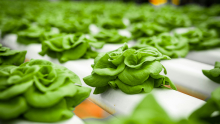
In Ontario, a fully automated greenhouse allows lettuce to be grown and harvested with virtually no human intervention—a first in Canada.
Haven Greens had to invest $50 million to make it happen. But the result is striking: the company can operate with just five employees in the greenhouse, whereas it would have required more than 100 pickers using the traditional method.

If you've been noticing white fluff floating around Montreal lately, you're not the only one. Those are seeds from the Eastern Cottonwood tree and it's the season that they're spreading through the air.
CBC News spoke to David Wees, Faculty Lecturer and Assistant Director of the Farm Management and Technology Program at McGill University, to find out more.
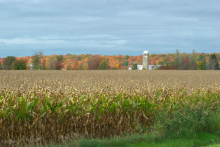
French doctors are raising the alarm about rising exposure to cadmium, a toxic heavy metal found in phosphate fertilizers. Cadmium is a known carcinogen linked to kidney damage, bone disease, and other long-term health issues, even at low doses. French doctors are urging France's government to tighten fertilizer regulations to reduce this public health risk.
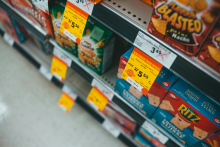
In the IGA and Metro grocery stores visited this week by Le Journal de Montréal, the price per pound of discounted products appeared on signage, but the regular price per pound was still not indicated, contrary to a new regulation that came into effect on May 7 which requires that grocers to "indicate a single unit of measurement for all goods of the same type." This rule aims to allow consumers to easily compare prices.

Canada's grocery sector code of conduct will finally come into effect on June 1, after years of discussion.
The voluntary grocery code, which all major retailers have agreed to sign on to, aims to support smaller retailers by providing guidelines for fair negotiations with suppliers.
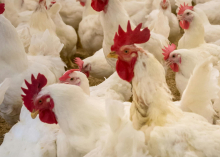
The Quebec cooperative Exceldor, known for its chicken breasts, wings, and nuggets, has taken steps to sell its assets to the Ontario company Aliments Sofina.
For the sale to be completed, it must be approved by two-thirds of the cooperative's members and two-thirds of the investment shareholders, as well as the Canadian Competition Bureau.
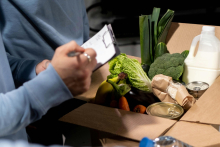
Food banks across Canada set a new record for demand in 2024, with more than two million monthly visits—nearly double the rate seen five years prior, reports CBC News.
One reason for the spike in demand is the rising cost of food.
"What we're encountering right now is a problem where food inflation is bigger than general inflation," economist and agronomist Pascal Thériault, Senior Faculty Lecturer at McGill University, told CBC.

While there are plenty of examples to the contrary, the general academic consensus is that boycotts don’t work for a sustained period, as consumers eventually disengage and reprioritize brand loyalties or price. According to a recent poll, however, the Globe and Mail reports that the Buy Canadian movement shows no signs of slowing down.

Some items from quintessentially Canadian brands have jumped in price at a Loblaws in Toronto, CBC News reports.
According to CBC's analysis of grocery products labelled as Canadian, while most products remained the same price and about two per cent decreased in price, the regular price of hundreds of products have increased since governments put out the call to buy food made in Canada. Some are from iconic Canadian brands, including Tim Hortons, St-Hubert, Swiss Chalet, and Chapman's.
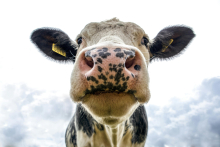
US President Donald Trump says Canada has been imposing sky-high tariffs on imported American dairy products. Agronomist and economist Pascal Thériault, Director of the Farm Management and Technology Program at McGill, spoke to CBC and Global News to give key context on this issue in their reporting:
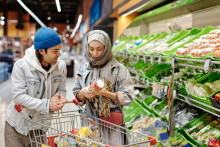
Quebec supermarket chains say boycotts of American products are having a direct impact on US food sales, TVA reports.
Grocery stores have put new measures in place to indicate the origin of their products. Loblaw recently announced they will be adding a logo to identify products subject to customs tariffs.
